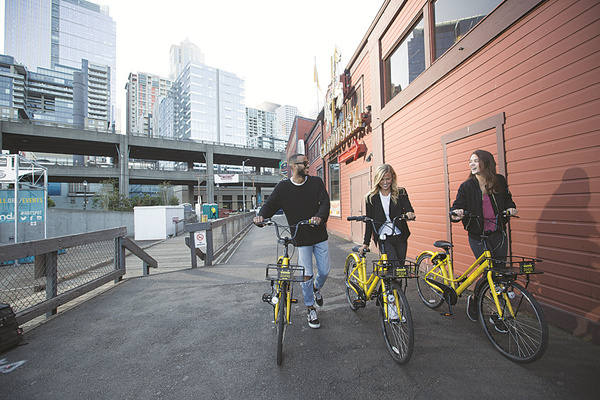Spreading the sharing news
 |
|
People use OFO bikes in Seattle. Photo provided to China Daily |
It took 1,000 years for paper to reach Europe after it was invented in China around 150 AD. Fortunately, the rest of the world will not have to wait so long to use the dockless shared bicycle systems that are creating new transportation options in China's cities.
After starting at Peking University in 2014, ofo is already operating in eight countries - the United States, United Kingdom, Kazakhstan, Japan, Malaysia, Austria, Singapore and Thailand - and it plans to be in 20 by the end of the year.
Zhang Yanqi, chief operating officer of ofo, says: "Going abroad has been ofo's vision from day one. Internationalization allows us to turn our brand from a China brand to a global brand. We also get a competitive advantage because we can attract global talent and see a lot of technologies around the world."
Asked why China was the first to develop dockless shared bikes, he replies: "In China, we have this huge problem of congestion and pollution. That is where the founding team at PKU started. China still has plenty of bike lanes, so city planners can save money by encouraging people to bike. Five or 10 years ago, China was still the kingdom of the bicycle, so we still have a culture of biking."
He added: "China has world-class bike manufacturers in terms of quantity and quality. Also, China's Internet startups have been booming in the past five years. So, both manufacturing expertise and software innovation is available."
Ofo has partnered with singer Rihanna and the Clara Lionel Foundation in a program to give bikes to girls in poor rural areas of the central African country of Malawi, where only 8 percent of girls finish secondary school. For them, getting to school has been a long and sometimes dangerous trip. Now, ofo's donated bikes are changing their lives by giving them educational opportunities.
Joseph Seal-Driver, ofo's UK operations director, discusses how the system was adapted for local conditions in London's Hackney area, where ofo launched recently.
"We have been engaging with the relevant authorities in London, including the Mayor's office and the Greater London Assembly, as well as Transport for London," he says. "We have been encouraged by their openness to innovative ideas to help tackle some of London's perennial transport problems, like congestion and air pollution. We are always in full consultation with the local government wherever we go and constantly responding to the needs and concerns of local community."
How do people get from their home or office to mass transit stations or to nearby stores? Zhang stresses that the core capability of ofo is to solve this last mile problem, which exists everywhere in the world.
The problem can be expensive both for individuals and governments. Zhang notes that Brazilians on average spend 30 percent of their household income on transportation. In the US, lower-income households spend 16 percent and middle-income people spend 11 percent.
Ofo is attractive to planners because it costs the government nothing and it's cheap for users. The company is completely privately funded by investors.
















